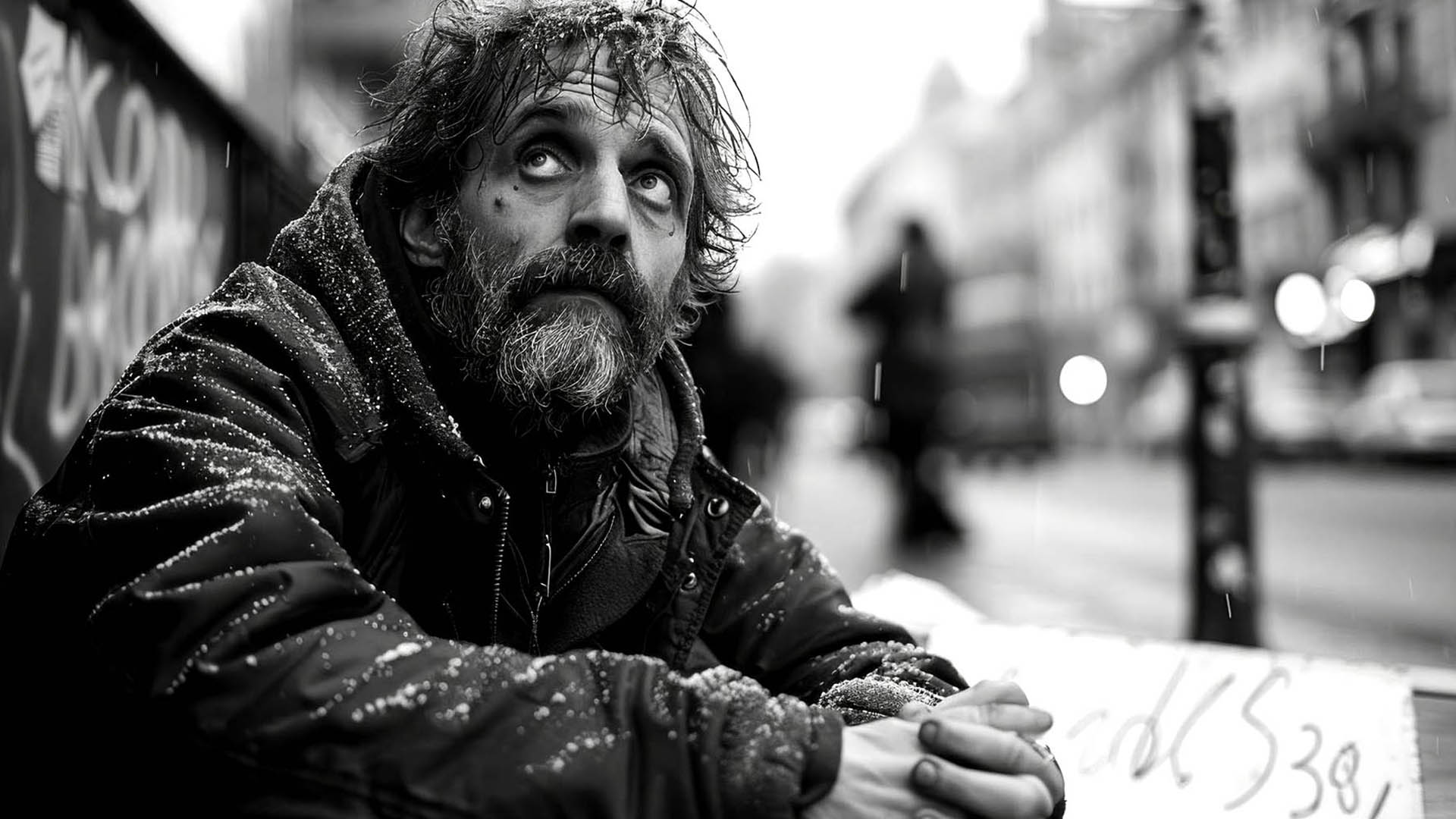Different Worlds
The moment he stepped out of Manila’s airport, the heat hit him like a wall, heavy, damp, suffocating. It clung to his skin, slowed his breath, and glued his shirt to his back. He had traveled before, carrying a guitar case over his shoulder, scribbling in a battered notebook, but this place was different. The city swallowed him whole.
The noise crashed like relentless waves: motorbikes darting through tangled traffic, car horns snapping like firecrackers. The colors stunned him. Bright tarps stretched above market stalls, jeepneys painted with saints and bold slogans, a patchwork of signs in English and Tagalog weaving visual chaos.
The smells followed one another: grilled meat, diesel fumes, the sour tang of stagnant water. The dizzying clamor felt familiar yet unsettling. But what rooted him in place wasn’t the chaos. It was something quieter. A barefoot woman crouched by a weathered church wall, her hair knotted and matted, her torn dress flapping lightly in the humid air. Beside her, a child with cheeks streaked in dirt reached out a small, hesitant hand to passersby.
Tourists swept past, cameras swinging, laughter trailing like loose ribbons. Their eyes slid away, their faces carefully averted. To those rich in comfort, they simply did not exist.
He slowed. The child’s hand trembled toward him, but his feet carried him forward, faster now, leaving behind fading voices. For a moment he thought of the coins in his pocket. Then nothing.
He had left home full of easy ideas about helping, certain good intentions would be enough.
But the land he stepped into was stripped bare, its air heavy with dust and quiet despair. Children’s eyes seemed too old for their faces, hardened by hunger that was no longer a tragedy but routine.
He gave what he could, small things, as much as possible: water, food, medicine, books. Even those small acts made a difference. Not everything, but enough. Enough to keep someone alive one more day, to ease a burden, to make a life just a little lighter. Enough to show him how little it truly took.
When he returned home, nothing had changed. Streets still lined with shops. Cafés remained crowded, people happily paying more for a single cup of coffee than he had spent to keep a child alive. Money slipped mindlessly through fingers. Coins dropped into tip jars, new gadgets bought, old ones discarded like yesterday’s trash.
And the same mouths that preached “one world” sipped their coffee and said, “It’s not my problem.”
Maybe that was the real poverty. Not hunger, not dust, but willful blindness. The comfort of closing one’s eyes. Living as if a few coins couldn’t shift the weight of the world.
But they could. He knew it. He had seen it. And now he could not unsee.
That night, alone in a sparse room, he held his guitar. The strings vibrated discordantly beneath his fingers, mirroring the dissonance in his mind. Images of outstretched hands, hollow eyes, and indifferent crowds replayed endlessly. Words spilled forth, sharp, uncompromising, a voice stripped of comfort. It spoke of strangers turning away, claiming their lives earned wholly by themselves, absolved of others’ suffering. A voice blaming hunger and despair on choice, dismissing pain to justify ease.
His song was confession. Not only a charge against the world but also himself. The easy distance drawn between lives, names, and fractured faces. The melody was accusation, relentless and unyielding.
Days after, he saw more. A man curled in the shadow of a tricycle, ribs sharp as bamboo. Girls weaving through night traffic, carrying baskets heavier than their bodies. An old woman stooped under the weight of a woven load. And always, the tourists, laughing, oblivious, passing through two worlds intertwined yet divided.
When his flight home came, he carried more than a suitcase. Pressing his forehead to the window thirty thousand feet above the Pacific, he wondered how he could return to a life of collecting things, filling closets, pretending comfort was enough.
Back in his apartment, guilt sharpened inside him like a blade. Shelves overflowed with unworn clothes, drawers crammed with forgotten trinkets, instruments gathering dust. He gave most of it away. When friends asked why, no words came. He only knew he wanted to live lighter, closer to the people he had seen.
This was the birth of Little Big Gift. Not yet a charity but a promise to live small in order to give more. His song an anthem, not a celebration, but warning, offering no solace, only challenge.
The truth was simple yet brutal. The world does not split neatly into deserving and undeserving, winners and losers. Circumstances are not always by choice. Yet that voice in the song that claims success frees us from responsibility lives in all of us, awake whenever we choose indifference over empathy.
He thought again of the people he had encountered, so easily ignored yet impossible to forget.
Years later, the song still traveled with him. Sometimes softly strummed in empty rooms, words hanging like unanswered questions. Other times sung back by strangers, proof that music can reach where conversation cannot.
The trip had opened his eyes. But real change began later in seeing, in reckoning, in acting. He knew the chasm between worlds may never close fully. But he could refuse to look away.
And perhaps that was enough a refusal to look away in a world too eager to pretend it does not exist.
異なる世界
彼がマニラの空港を出た瞬間、重く湿った熱が壁のように彼を襲った。肌にまとわりつき、息を呑むほどだった。シャツは背中に張り付いた。彼はこれまでにも何度も旅をしてきた。肩にギターケースをかけ、ボロボロのノートに思いを綴りながら。しかしここは違った。街が彼を丸ごと呑み込んだのだ。
轟音が絶え間なくたたみかける。絡み合う交通の中、バイクが縫うように走り、クラクションが火花のようにはじける。色彩が彼の視線を奪った。屋台の上に張られた鮮やかな布。聖人や力強い言葉が描かれたジープニー。英語やタガログ語の看板が視界に乱舞する。
匂いが次々に押し寄せた。焼き肉の香り、ディーゼルの臭気、淀んだ水のすっぱい匂い。喧騒はどこか身近だが、同時に不安を禁じ得ない。だが彼を立ち止まらせたのは、静かな光景だった。壁際に裸足でしゃがむ女性。絡まり髪は乱れ、破れた服が湿気の中で揺れていた。その隣には、汚れた頬の子供が躊躇いながらも人々に小さな手を差し出す。
観光客はカメラを振りながら過ぎ去り、笑い声が風に散った。誰も彼女たちに目を向けなかった。存在をなかったことにしていたのだ。
彼は足を止めた。子供の震える手が彼に伸びたが、彼は歩き続けた。だんだん走り、声が遠ざかる。ポケットの小銭に一瞬心が動いたが、何もせずに進んだ。
彼は善意だけで十分だと軽く考えて旅立った。
しかしその地は乾ききっていた。埃に包まれ、静かな絶望が立ち込める。子供たちの目は老け、飢えはもはや悲劇ではなく日常だった。
彼はできる限りのささやかなものを差し出した。水、食べ物、薬、本。小さな行為が確かな違いを生んだ。すべてではないが、誰かを一日生かし、重荷を軽くし、問題を一つ減らし、生を少し楽にする。それだけで世界は少し変わるのだと、彼は知った。
帰国後、変わったものはなかった。通りは店が並び、カフェは満員だ。人々は彼が命をつないだ子供たちに費やした額より高い値段でコーヒーを楽しむ。お金は無造作に使われ、チップ箱に落ち、新しい機械を買い、古いものは捨て去られる。
そして「一つの世界」を掲げる彼らはコーヒーを飲みながらつぶやく。「自分の問題ではない」と。
それこそが真の貧困かもしれない。飢えでも埃でもなく、意図的に見ようとしない心の貧しさ。目を閉じる快適さ。数枚の硬貨で世界の重さを変えられないと信じる気軽さ。
しかし、違う。彼は知っている。見てしまった。そしてもう、目を逸らせない。
簡素な部屋で一人、彼はギターを抱えた。指で弦を鳴らすたび、不協和音が心の乱れを映す。伸ばされた手、空虚な瞳の女性、無関心な群衆。言葉が溢れ、鋭く容赦なく響く。自分の人生を誇り、他者を顧みない者たちの声。飢えや絶望を「選択」と責め、自らの快適さを正当化する声。
その歌は告白だった。世界を問うと同時に自分を問う。名前も違い、顔も違う命の間に引かれた線。旋律は問いであり非難だった。
数日後、より深刻な現実を目の当たりにする。三輪車の影に縮こまる男。夜遅く花を売る少女。重い籠を背負う老婆。笑いながら気づかない観光客。
帰りの飛行機で、彼は重い思いを抱えていた。窓に額を押し付け、物に囲まれた快適な生活に戻れるのか考える。
罪悪感は鋭くなる。使われぬ服、忘れられた小物、埃の積もった楽器。彼は多くを手放した。ただ、あの人たちに少しでも近くにいたかった。
こうして「リトル・ビッグ・ギフト」は始まった。慈善ではなく、より与えるため小さく生きる誓い。歌はその象徴。慰めではなく警告。挑戦の歌。
真実は冷徹だ。世界は単純に分けられない。状況がすべて選択かは疑わしい。しかし責任放棄を謳う歌の声は深く響き、無関心は日々選ばれる。
彼はあの忘れられぬ人々を思い返した。
何年も経ち、歌は傍らにある。時に静かに奏でられ、時に知らぬ者が歌い返す。答えなき問いを越え、響き続ける。
旅は目を開かせた。だが本当の変化は後から来た。見ること、想うこと、行動すること。世界の分断は完全ではなくても、目をそらさないこと。それが十分だった。目覚めた人生の始まり。


Leave a Reply